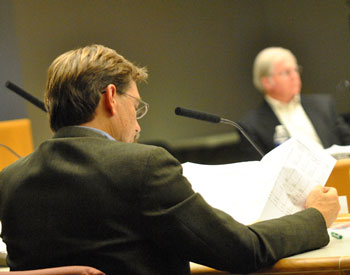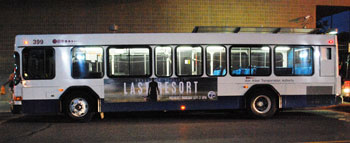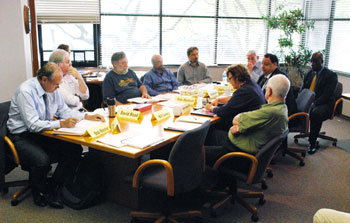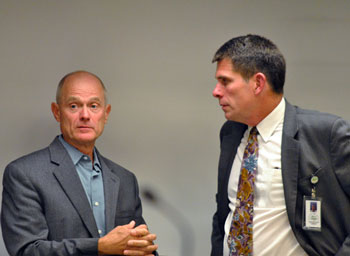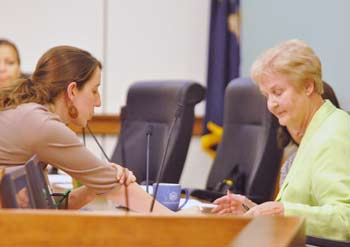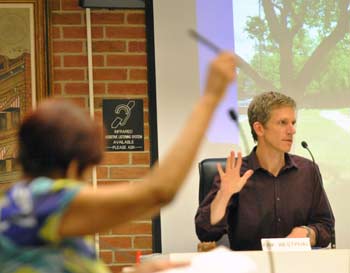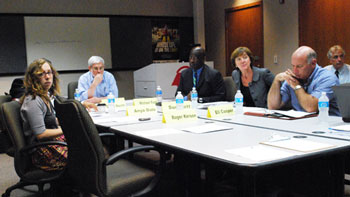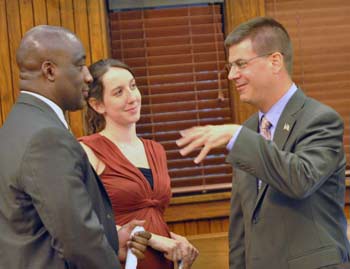AATA Keeps Rolling Toward Countywide
Ann Arbor Transportation Authority special board meeting (Oct. 2, 2012): As expected, the AATA board voted unanimously, with all seven members present, to request that the Washtenaw County clerk file articles of incorporation for a new transit authority, established under Act 196 of 1986 and called The Washtenaw Ride.
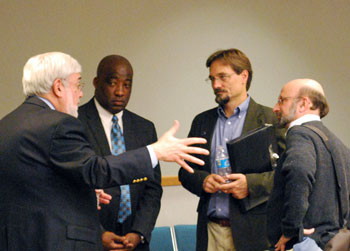
From left: Jesse Bernstein, AATA CEO Michael Ford, Charles Griffith and Roger Kerson. Bernstein, Griffith and Kerson are AATA board members. (Photos by the writer.)
Based on discussion at the board’s Sept. 27 meeting, it was the AATA’s expectation that the articles would be filed as soon as Oct. 3, and the wording of the AATA’s resolution indicated that the filing should take place “immediately.”
And according to Washtenaw County clerk staff, that’s what happened. Representatives of the AATA were authorized as couriers by the clerk, and they conveyed the physical documents to Lansing.
Letters that included a notice of intent to file had been sent on Sept. 27 to every jurisdiction, and to every elected official in the county.
At the Oct. 2 meeting, board chair Charles Griffith and former chair Jesse Bernstein expressed thanks to staff and community members who’ve worked over the last two years to get the process to this point. The basic theme of most of the remarks was in the spirit of the long journey ahead.
The long journey begins with the entity that’s created by the filing – which will initially have no assets, staff, or ability to operate transportation service in the county. A 15-member board composition for the new authority is already reflected in the membership of the board of the pre-incorporated board (called the U196 board), which has been meeting already for a year. Some of those board members attended the Oct. 2 meeting – David Read (North Middle District), Bob Mester (West District), Bill Lavery (South Middle District) and David Phillips (Northeast District).
Districts that include multiple jurisdictions appoint their representatives under inter-local agreements made under Act 7. In the case of the city of Ann Arbor, the appointments to the new transit authority need to be made through the city council’s confirmation of mayoral nominations.
To make the transition from the AATA to The Washtenaw Ride, under terms of a four-party agreement, voters would need to approve a funding source adequate to pay for the proposed expanded service plan. The four-party agreement is between the AATA, the cities of Ann Arbor and Ypsilanti, and Washtenaw County.
The five-year service plan for expanded service includes: (1) countywide demand-responsive services and feeder services; (2) express bus services and local transit hub services; (3) local community connectors and local community circulators; (4) park-and-ride intercept lots; and (5) urban bus network enhancements. For Ann Arbor, the program includes increased bus frequencies on key corridors, increased operating hours, and more services on weekends. According to a Sept. 5 press release from the AATA, Ann Arbor and Ypsilanti will get a 56% increase in service hours compared to current levels.
The AATA has indicated that a possible funding scenario is to ask voters in Washtenaw County to fund the new transit authority with a property tax of 0.584 mills – in an election that could come as early as May 2013. For a house worth $200,000, with a state-equalized value of $100,000, an 0.584 mill transit tax would cost that property owner about $58 per year. For an Ann Arbor resident with a $200,000 house, adding the 0.584 mill tax to the existing city transit tax of roughly 2 mills works out to a transportation tax burden of about $258 a year.
Also under the four-party agreement, the two cities’ transit taxes would become part of The Washtenaw Ride’s funding.
The transition would potentially not take place at all, if a majority of voters don’t approve it. Under the terms of the four-party agreement, a voter-approved funding source for the expanded services must be identified by the end of 2014.
Washtenaw County’s role is limited to the filing of the articles of incorporation for the new transit authority. The act of incorporation will include by default all jurisdictions in Washtenaw County. However, filing of the articles opens a 30-day window for jurisdictions to opt out of the arrangement. That can be accomplished through a vote of a jurisdiction’s governing body.
Michael Ford, AATA’s CEO, said at the Oct. 2 meeting that he hoped to schedule the first meeting of The Washtenaw Ride’s board for Oct. 11. Although it’s a fair assumption that the current AATA board members will be nominated by mayor John Hieftje to serve as Ann Arbor’s representatives to the new transit authority, there’s no council meeting scheduled between now and Oct. 11 when the council could vote to make those appointments official. [Full Story]




